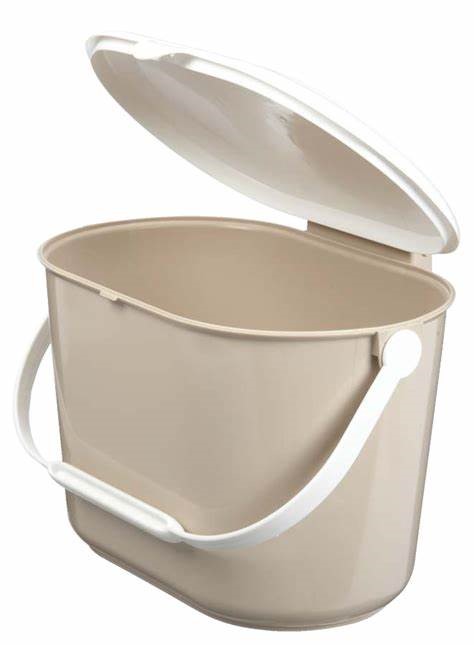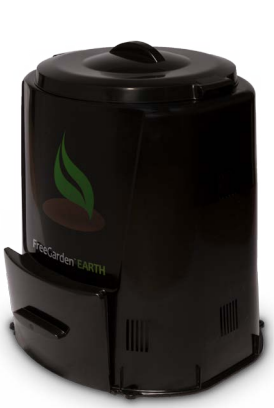Backyard composting is a natural and environmentally friendly way to dispose of organic waste, such as fruit and vegetable scraps, leaves, grass clippings, and coffee grounds. By composting at home, you can reduce the amount of waste sent to landfills, and create a nutrient-rich soil amendment that can be used in your garden or lawn.
The City of Owen Sound does not have a curbside organics program. To divert some organic material from your household garbage, kitchen containers ($7.12) and backyard composters ($35.00) can be purchased at the following locations year round:
- City of Owen Sound Public Works
- Owen Sound City Hall (kitchen containers only)
Your backyard composter will come with a detailed instruction book.
Kitchen Compost Containers:

Backyard Composters:

Backyard Composting Benefits
There are many benefits to backyard composting, including:
- Reducing waste: By composting your organic waste, you can divert a significant amount of material from the landfill. This helps to reduce greenhouse gas emissions and preserve landfill space.
- Creating nutrient-rich soil: Compost is a natural fertilizer that can improve soil quality and promote plant growth. It can also help to retain moisture and suppress plant diseases.
- Saving money: Composting at home can save you money on fertilizers and soil amendments, as well as on garbage disposal fees.
- Encouraging sustainability: Backyard composting is a simple way to live a more sustainable lifestyle. It promotes responsible waste management and helps to reduce the carbon footprint associated with food waste.
Materials You Can Compost in Your Backyard
You can add a wide variety of organic materials to your backyard compost pile.
These include:
- Fruit and vegetable scraps: This includes things like peels, cores, and rinds.
- Grass clippings: This is a good source of nitrogen.
- Leaves: This is a good source of carbon.
- Coffee grounds and tea leaves: These are a good source of nitrogen.
- Eggshells: These provide calcium and other minerals.
- Yard trimmings: This includes things like branches, twigs, and weeds.
- Shredded newspaper and cardboard: This is a good source of carbon.
- Sawdust and wood chips: These are a good source of carbon,but should be used sparingly as they can make the compost pile too dry.
- Hair and fur: This is a good source of nitrogen.
It is important to maintain a balance between nitrogen-rich materials (sometimes called "green" materials) and carbon-rich materials (sometimes called "brown" materials) in your compost pile. A good rule of thumb is to use a ratio of about 3 parts brown materials to 1 part green materials.
You should also avoid adding materials that are high in fat, oil, or animal products, as these can attract pests and create unpleasant odors.
In addition to adding materials to your compost pile, you should also make sure to regularly turn and water the pile to ensure that it decomposes properly. By following these simple guidelines, you can create a rich and nutrient-dense compost that will help to nourish your garden and reduce waste.
Do Not Put These Items in Your Compost
While there are many organic materials that can be added to a backyard composter, there are also some things that should not be added. These include:
- Meat, fish, and dairy products: These items can attract pests and create unpleasant odors.
- Fats, oils, and grease: These materials can also attract pests and create unpleasant odors.
- Pet waste: This can contain harmful bacteria and parasites that can survive in the compost and potentially spread to humans.
- Diseased plants: Plants that are infected with diseases or pests should not be added to the compost, as this can spread the problem to other plants.
- Weeds with mature seeds: If the weed has already produced seeds, those seeds may survive the composting process and sprout in your garden.
- Charcoal ash: This can contain chemicals that can harm plants and soil.
- Synthetic materials: Anything that is not biodegradable, such as plastics or synthetic fabrics, should not be added to the compost.


